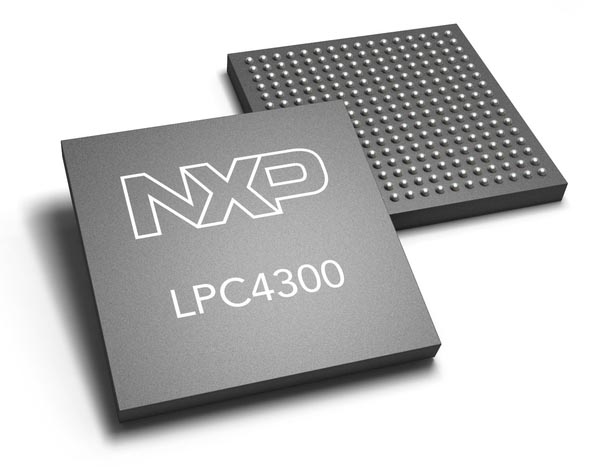NXP Semiconductors announced the availability of the LPC4300 Digital Signal Controller (DSC) – at 204 MHz, the world’s fastest ARM Cortex-M4 processor. The LPC4300 is the industry’s first asymmetrical dual-core DSC with a Cortex-M0 co-processor. Also today, NXP announced that it has increased the performance of its LPC1800 series to 180 MHz, extending its lead as the world’s fastest Cortex-M3-based microcontroller. Designed in parallel, the LPC4300 and LPC1800 have been manufactured using the same 90-nm technology, are pin- and software-compatible, and share many key features.

The first LPC4300 part available is the LPC4350 in a BGA256 package – a Flashless part with 264KB SRAM – available now at major distribution partners. Flash parts will be available in Q1 2012.
Facts / Highlights on the LPC4300 and LPC1800
- At 204 MHz, the NXP LPC4300 is the fastest ARM Cortex-M4 microcontroller available today. This performance makes the LPC4300 series ideal for a wide range of applications, including embedded audio, high-end motor control, industrial automation, point-of-sale, medical devices, and automotive accessories.
- The LPC4300 has a unique asymmetrical dual-core architecture, featuring two ARM processors – a Cortex-M4 core, optimized for real-time processing, and a Cortex-M0 core, optimized for real-time control. The small gate-count Cortex-M0 has been added to offload many of the control and I/O handling duties that drain the bandwidth of the Cortex-M4 core, allowing the Cortex-M4 to concentrate on what it does best: crunching numbers for digital signal control applications. Both cores are capable of running at 204 MHz.
- Unique configurable peripherals on the LPC4300 and LPC1800 include:
- The State Configurable Timer sub-system, which lets designers configure advanced timing operations with state machine control including complex motor-control functions
- The Quad lane SPI flash interface, which extends the code and data memory map using inexpensive, low-pin count SPI data flash.
- Serial GPIO interface, which is capable of emulating standard interfaces such as multiple I2S for a 7.1 multi-channel audio connection.
- The State Configurable Timer sub-system, which lets designers configure advanced timing operations with state machine control including complex motor-control functions
- NXP and its partners offer extensive software and development tool support for the LPC4300 and LPC1800, including a CMSIS-compliant peripheral driver library; a full-featured open-source USB library and USB ROM drivers supporting its Hi-Speed USB Host/Device/OTG interfaces; and the emWin graphic library from SEGGER free of charge for NXP customers. Dual-core debugging support is provided by leading ARM development tools including IAR Systems, Keil, and NXP’s Eclipse™-based LPCXpresso IDE.
- Suggested pricing for the LPC4300 series starts at $3.75 for quantities of 10,000 pieces and suggested pricing for the LPC1800 series starts at $2.95 for quantities of 10,000 pieces. Other packages include TFBGA100, LQFP144, LQFP100, LQFP208, and BGA180.
